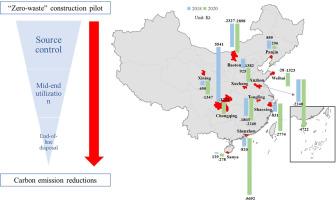Estimating carbon emission reductions from China's “Zero-waste City” construction pilot program
IF 11.2
1区 环境科学与生态学
Q1 ENGINEERING, ENVIRONMENTAL
引用次数: 0
Abstract
Zero-waste strategies aim to reduce the growing generation of all types of solid waste streams. China has launched a “Zero-waste City” construction pilot program to mitigate pollution, lower carbon emissions, and promote a circular economy. However, a knowledge gap remains in terms of quantifying the carbon emission reduction performance when this program was implemented in the pilot cities. This study developed a methodology to account for the carbon emission reductions from the solid waste management processes, including source control, mid-end utilization, and end-of-line disposal in China's zero-waste pilot cities. Results indicated that the intensity of solid waste generation has been effectively controlled, the utilization level has been significantly improved, and the capacity for harmless disposal has been greatly enhanced, leading to substantial carbon emission reductions and climate benefits. Further decomposition of the driving forces using the Logarithmic Mean Divisia Index (LMDI) model revealed that emission intensity and treatment structure were the primary contributors to the carbon emission reductions. These findings could provide valuable insights for advancing China's in-depth construction of “Zero-waste City” projects and inform zero-waste management strategies in other countries.

估算中国 "零废弃城市 "建设试点项目的碳减排量
零废弃战略旨在减少日益增多的各类固体废弃物。中国已启动 "零废弃城市 "建设试点计划,以减轻污染、降低碳排放、促进循环经济。然而,在试点城市实施该计划时,在量化碳减排绩效方面仍存在知识空白。本研究开发了一种方法来核算中国零废弃试点城市固体废物管理过程中的碳减排量,包括源头控制、中端利用和末端处置。结果表明,固体废物产生强度得到有效控制,利用水平显著提高,无害化处置能力大幅提升,实现了可观的碳减排和气候惠益。利用对数平均指数(LMDI)模型对驱动力进行进一步分解后发现,排放强度和处理结构是碳减排的主要贡献因素。这些研究结果可为推进中国 "零废弃物城市 "项目的深入建设提供有价值的见解,并为其他国家的零废弃物管理战略提供参考。
本文章由计算机程序翻译,如有差异,请以英文原文为准。
求助全文
约1分钟内获得全文
求助全文
来源期刊

Resources Conservation and Recycling
环境科学-工程:环境
CiteScore
22.90
自引率
6.10%
发文量
625
审稿时长
23 days
期刊介绍:
The journal Resources, Conservation & Recycling welcomes contributions from research, which consider sustainable management and conservation of resources. The journal prioritizes understanding the transformation processes crucial for transitioning toward more sustainable production and consumption systems. It highlights technological, economic, institutional, and policy aspects related to specific resource management practices such as conservation, recycling, and resource substitution, as well as broader strategies like improving resource productivity and restructuring production and consumption patterns.
Contributions may address regional, national, or international scales and can range from individual resources or technologies to entire sectors or systems. Authors are encouraged to explore scientific and methodological issues alongside practical, environmental, and economic implications. However, manuscripts focusing solely on laboratory experiments without discussing their broader implications will not be considered for publication in the journal.
 求助内容:
求助内容: 应助结果提醒方式:
应助结果提醒方式:


